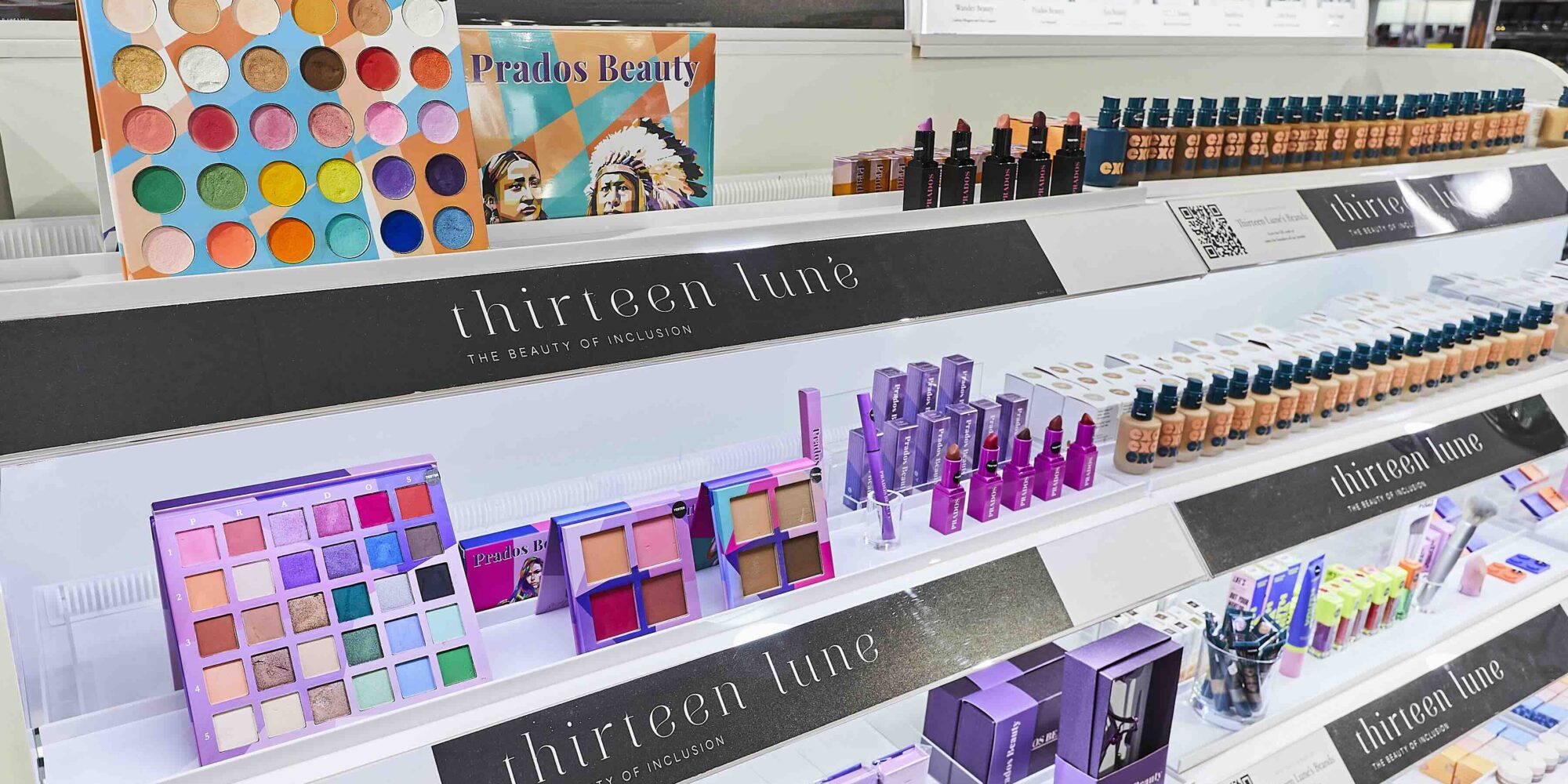
Caught In The Crossfire: Where Brands Stand With Thirteen Lune Amid The Inclusive Retailer’s Legal Battle
Beauty journalist and “Gloss Angeles” podcast co-host Kirbie Johnson broke the news last week on her Substack “Ahead of the Kirb” of a lawsuit filed by Thirteen Lune investors Beauty Generations Fund and Relevance Capital against Thirteen Lune co-founder Nyakio Grieco, the retailer’s new ownership (SNR Capital, a financial firm associated with distributor The PCA Companies, and its principals Conor Riley and Piyush Golia), Jay Lundy, managing director at NAACP Capital, and Sonoran Capital Advisors, a firm that led Thirteen Lune through an assignment for the benefit of creditors or ABC process, which is an alternative to bankruptcy.
The lawsuit accuses the defendants of failing to provide financial transparency related to the ABC process and Grieco of embezzling over $165,000 from Thirteen Lune for personal expenses between January and June 2024. Grieco adamantly denies she embezzled from Thirteen Lune and maintains her expenses were approved by former management. The lawsuit states Grieco was installed as the CEO of Thirteen Lune by SNR Capital, a role formerly held by co-founder Patrick Herning, who exited the business last year.
Brands are caught in the crosshairs of the legal battle over Thirteen Lune. Because SNR Capital vowed to mend its relationship with brands upon its takeover of the retailer, we decided to check in with them to see how that’s going. So, for the latest edition of our ongoing series posing questions relevant to indie beauty, we asked brands the following questions: Are or were you owed money by Thirteen Lune? Have you been paid any or all of it by the new ownership? What should Grieco’s role be going forward? Are there lessons you’ve learned or that you think the beauty industry should be aware of from this ordeal?
We distributed the questions to 60-plus brands and heard back from nearly 20, including eight that sent the below answers, three others owed money by Thirteen Lune and one other compensated for an amount the retailer previously owed it. The outreach turned up at least three brands listed on Thirteen Lune’s website that appear to have closed (Guaia Madre, Mintty Makeup and LipLoveLine). In the past, we reported on the closures of Mora Cosmetics and The Established, brands that had been carried by Thirteen Lune. Meanwhile, the retailer continues to strike partnerships with brands and has launched Toty, the skincare and sun care brand linked to Sofia Vergara.
- Namrata Kamdar Founder, Plenaire
We are owed money by Thirteen Lune. We had an initial consignment contract with them, and they sold small amounts of our products through their Larchmont flagship store, paying for stock on a consignment basis. The last payment on record from them was received in May 2024.
However, in January 25, we were asked to raise invoices through 13 Lune ABC LLC, but none of these consignment invoices—though relatively small (under $500)—have been settled to date.
As for J.C. Penney, they initially offered an order of 1,200 products each across our Plenaire range (10 SKUs) with pro forma payment and a 45-day payment term on replenishment. That is a large amount of stock for any brand, even an established one.
However, their return clauses posed significant risk, so we offered a lower stock amount. Frankly, it seemed unusual to receive such a large order upfront. Ultimately, we could not reach an agreement on the clause, but, in good faith, we ring-fenced a smaller set of stock for nearly six months, following up multiple times without receiving a confirmed ship date. Eventually, we had to release the stock for our website and other wholesale partners.
We worked with 13L representatives Janelle Freeman and Jenna Aldridge and held stock between July and October 2022. Despite signing a vendor agreement, we never actually received a purchase order. It’s disappointing to see such a visionary retail concept undermined by multiple leadership failures.
Regarding leadership changes, it’s surprising that only Nyakio Grieco is named in the lawsuit while Patrick Herning is absent from the discussion. This raises questions about accountability.
Transparency and financial responsibility are critical in retail partnerships. We work closely with our retailers to assess fit before committing large amounts of stock. While it may be tempting to expand into multiple retailers, it is even more important to evaluate whether they can create and sustain consistent demand while effectively representing each brand they take on.
Many large retailers today have the right to return stock, and they often expect brands to drive traffic and stimulate demand, which creates an untenable situation for an independent brand that often doesn’t have the immediate cash flow to support on all fronts to begin with. That is why pro forma payments work for small brands and can cover marketing investments to help build awareness.
- Kapua Browning Founder, Honua Hawaiian Skincare
We were lucky to have demanded the majority of our payback early in the game before the major issues hit. We saw the unraveling and were very strong about not sending more product, fulfilling any Pos until payment was made for prior. They probably owe us a few thousand dollars only, but I know we are one of the few lucky brands.
I will say we were in a huge financial deficit a year after launching with Thirteen Lune due to the their initial rollout promise and projected POs. We had to spend a lot of upfront money on packaging, production, filled goods, taking away cash flow for other operations that could have helped us grow. We put a lot of eggs in that basket, and when nothing happened, we had to pivot quickly to ensure we could stay afloat.
They also put products on shelves that had sat in their warehouse for over two years, which is not a great way to showcase or debut a clean beauty brand to the mainstream world. We feel terrible for the other brands that were hit even worse, but we still felt very taken advantage of.
A lesson that I learned was to be more cautious entering into larger retail partnerships, even when they feel like a great fit initially or offer potential growth. I have also learned that we have to be more methodical with our growth in general and not promise to roll out in more than five to 10 stores at a time and should have never pre-ordered large amounts of products based on projections.
So, while there may be many with a lot to say about Nyakio, I am choosing to focus on the mistakes I made and how I can learn and grow from them.
- Sophia Chabbott Founder, Testament Beauty
We haven’t had any issues there.
- Jamila Powell Founder, Naturally Drenched
I was paid for the J.C. Penney partnership, but I do have some outstanding invoices from 2024. I'm currently reviewing those unpaid invoices, and since I haven't submitted them to the new team yet, I can’t speak to whether or not they are being paid at this time.
Thirteen Lune has always been Nyakio’s vision, and it’s ultimately up to the new ownership to decide what role they believe will be most effective for the brand moving forward. Mistakes were made—as can happen with any new brand and retailer—but I will say I truly appreciated the opportunity to work with Thirteen Lune. Nyakio was always kind to me, and I’ve had positive experiences with several members of the team.
I can’t speak to the internal matters, but, from my understanding, the lawsuit seems like a standard step in the process when an assignment for the benefit of creditors (ABC) occurs. Investors put in capital, didn’t receive the expected return and are now trying to recover their losses. A larger concern might be why investors weren’t more aware of the company’s financial standing after their investment, but before the ABC was initiated.
There’s also a broader issue within the industry: smaller brands and retailers, especially those that champion smaller brands, need to find more collaborative ways to support each other. Most indie beauty brands don’t have significant outside investment or budgets for robust marketing and in-store sales teams. Nonpayment, unfortunately, is not a new issue in retail, and it’s something that should be addressed more openly and systemically across the industry.
- Purvisha Patel Founder and Dermatologist, Visha Skincare
Thirteen Lune does not owe Visha Skincare money.
- KENISHA RUFF Founder and Creative Director, Marie Hunter Beauty
I was owed money by Thirteen Lune, with five outstanding invoices for 2024. While I prefer not to disclose the amount, I can confirm that I have not yet been paid for these invoices by the new ownership. We did receive a claims form from 13L ABC, which we completed and returned as requested, so we are currently awaiting further updates on potential payment.
Regarding Nyakio’s role as CEO, I believe she should remain in the position moving forward. As a co-founder, she has been a central figure in shaping Thirteen Lune’s mission and brand identity, particularly in championing inclusivity and supporting BIPOC beauty brands. While challenges have arisen, continuity in leadership could provide stability during this transition, ensuring that the original vision for the retailer does not get lost amid financial restructuring. That said, transparency and accountability will be key to rebuilding trust with both brand partners and consumers.
This situation highlights an important lesson for independent beauty brands: Due diligence in retail partnerships is critical, particularly when it comes to financial agreements and payment structures. The beauty industry often celebrates inclusivity and community, but, at the end of the day, business fundamentals such as financial transparency and reliable payment terms cannot be overlooked. Brands need to proactively safeguard themselves by negotiating clear terms, staying on top of outstanding invoices and having contingency plans for when retailers face financial instability.
Ultimately, this ordeal underscores the need for more open conversations about financial health within the beauty retail space. As indie brands continue to navigate partnerships with larger retailers, there needs to be greater accountability on both sides to ensure that brands are not left financially vulnerable.
- Meerika Khanna Founder, Rthvi
Rthvi has had a positive partnership with Thirteen Lune. While both the previous and new organizations owe us money, we have received communication from Nyakio and her team regarding the settlement of the outstanding amount. They have been proactive in addressing this issue, and I am optimistic that it will be resolved soon.
A valuable lesson we can all learn from this situation is that transparency is essential for navigating difficult situations. Clear communication and accountability are fundamental to building trust and resilience, especially during difficult times.
- RAEDAWN JOHNSON Founder, Balaeyon
In light of business discrepancies in our partnership, we decided to part ways with Thirteen Lune unaware of the bigger issues at hand.
If you have a question you'd like Beauty Independent to ask brands, send it to editor@beautyindependent.com






Leave a Reply
You must be logged in to post a comment.